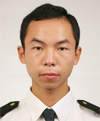 Comments from international Students
Comments from international Students

 Name: Gyonho Shin
Name: Gyonho ShinNationality: South Korean
Major: Course of Marine Life Sciences
University attended: Pukyong National University
When I was approaching graduation at university in Korea, I became interested in breeding production and decided that I would like to study Japan's advanced aquaculture technology in particular. I thought that if I came to the Tokyo University of Marine Science and Technology I would be able to study the subjects that interested me with leading professors in the field so I decided to study abroad.
When I started my research here there were many things that were different from my university in Korea but I was able to learn analysis methods that were not available at my old university and I am having a really great time.
I knew that Japanese culture was quite different from Korea and have been having a hard time since I actually started living here. I am quite shy so it was difficult to get to know Japanese people. And, of course, my Japanese wasn't great so I didn't catch what people were saying to me and I couldn't get people to understand what I was trying to say. However, I think that Japanese culture is great because it places emphasis on order and compromise and not bothering other people.
Marine products are extremely important as part of the solution for future food supply issues. However, catches are getting smaller globally year after year and aquaculture is becoming indispensable. After I graduate, I would like to contribute to the field of aquaculture in Korea using what I have learned at TUMSAT.
 Name: Zhu YuanYuan
Name: Zhu YuanYuanNationality: Chinese
Major: Course of Marine Life Sciences
University attended: Zhejiang Ocean University
My favourite class is Japanese. I really recommend the Japanese language classes at TUMSAT. The most difficult thing is finalizing my own research plan. I want to be a teacher after I graduate.
I was a bit worried about the food before I came to Japan but it is actually really good and I haven't had any problems. I sometimes worry about my health because I am really busy all the time but I am making sure that I get enough sleep. Life in Japan is convenient and fun so don't worry about coming to study here.
 Name: Zhuang Xin
Name: Zhuang XinNationality: Chinese
Major: Course of Marine Life Sciences
University attended: Dalian Ocean University
I decided to study in Japan because I wanted to study in my specialist field and I also wanted to study Japanese. The Japanese classes are good fun and the teachers are really nice. But I find it difficult when I talk to Japanese people. I want to keep on studying Japanese in the future and when I graduate, I want to go on to the doctoral course.
Before I came to Japan I thought that life would be difficult what with the high prices and the fact that my Japanese wasn't good but I have had a lot of fun since I got here. There are a lot of places to visit in the Tokyo area and it's really great fun going shopping with my friends.
If you are thinking of studying in Japan, I would advise you to work hard on your Japanese. A fun life awaits you here.
 Name: Li Qian
Name: Li QianNationality: Chinese
Major: Course of Marine Life Sciences
University attended: Shanghai Ocean University
I decided to study here because TUMSAT has a long history and because the research environment is so good. The most fun thing is the experiments. I am really happy when I manage to solve a problem. Learning Japanese is difficult, especially conversation but the teachers and the older students in my research lab are good to me. I am hoping to go on to the doctoral course after I graduate.
Before I came here to study, I was a bit worried things like differences in lifestyle between Japan and China but since I arrived, I have found Japanese life to be interesting and every day is a fulfilling experience. I have been to a lot of famous places like Odaiba, Kamakura and Takao-san mountain with my friends and I will always remember the autumn leaves at Takao-san mountain. I sometimes miss my family in China and I feel sad but when I do, I call my parents or talk to my friends.
For people who are going to study in Japan, Japanese language is really important. Make sure you study hard. The research is sometimes difficult but have faith! I'll be working hard, too!
 Name: Zou GangGang
Name: Zou GangGangNationality: Chinese
Major: Course of Marine Life Sciences
University attended: Zhejiang Ocean University
I majored in marine biology at university in China and became very interested in marine science. Japan is an advanced country and the Tokyo University of Marine Science and Technology is a top-level university in the aquatic products field. I decided to study in Japan to learn about the culture of a foreign county as well as to learn an even higher level of science and technology. I think I would like to go on to study on the doctoral course once I graduate from the Master's course.
Life in Japan is very pleasant. Japanese people are very polite and the streets are very clean. It is a bit of a shame that holidays in Japan are so short as I don't have enough time to go back to China.
Good luck to everyone who is thinking about studying here in Japan.
 Name: Surin Shim
Name: Surin ShimNationality: South Korean
Major: Marine Environmental Studies
University attended: Pukyong National University
I heard about the JCK Program when I was thinking about continuing my study of oceanography and thought it was a good opportunity so I decided to study in Japan. TUMSAT has a lot of information and data related to oceanography and, as someone who wants to be an oceanographer in the future, it really interested me. The university also has 6 boats and there are opportunities for on-board training which are very useful. However, not only is it difficult to conduct experiments as they take a really long time, but because TUMSAT is only a specialized university, there are not many opportunities for club or sports activities.
I had no special interest in Japan before coming here but once I arrived, I got interested in Japanese food, culture and the characteristics of the people. Japanese ramen noodles, in particular pork broth noodles, are really good! When Japanese friends go on a trip, they always bring me back a present. I was amazed at the way everyone sticks to the rules and keeps their word. And even though my Japanese is not great, people listen to everything I have to say and try really hard to understand what I mean. Sometimes I am not sure how to handle this kind of consideration but I accept it as a part of Japanese culture.
I would like to say 'where there's a will, there's a way' to those who are thinking about studying at TUMSAT. If there is anything I can do, I am willing to help.
 Name: Yu Kun
Name: Yu KunNationality: Chinese
Major: Marine Environmental Studies
University attended: Ocean University of China
I wanted to broaden my horizons and see more of the world outside China so I decided to study abroad. TUMSAT has a well-established, well-known graduate school. On top of that, TUMSAT is on the cutting-edge of science and technology which is developing at breakneck speed these days and it has many skilled teachers. I thought the university would really help me to bring my latent energy to the fore.
Japanese is difficult and I am still not very good at it so I get very nervous when I am talking to the people in the lab. But I am working hard in my Japanese class because it is good fun studying Japanese with students from other countries. After I graduate, I think I would like to go on to the doctoral course.
Japan was an iconic country for me with its beautiful scenery and rich cultural heritage. The streets are clean and life in general is very convenient. But prices are very high.
I would like to say 'there is no such thing as failure. You can't fail if you are trying. You only fail when you give up,' to students who are going to study abroad. Good luck.
 Name: Wu LianHui
Name: Wu LianHuiNationality: Chinese
Major: Marine System Engineering
University attended: Ocean University of China
TUMSAT is extremely famous for oceanography and fisheries science and I decided to study here to learn about leading Japanese marine development and environmental conservation technologies. I learn something new every day from a number of excellent teachers. The research and the Japanese language are hard work but learning Japanese is interesting. It's also fun to spend my time off with students from a number of different countries. After I graduate, I am thinking of either working in Japan or going on to the doctoral course.
Life in Japan is really comfortable and Japanese people are really kind. The older students and the Japanese tutors help out with many things not only connected with studying but with life in general so there is nothing to worry about.
I have met a lot of people at TUMSAT and have learned a lot as well. It really is a great university.
 Name: Yang Zhe
Name: Yang ZheNationality: Chinese
Major: Marine System Engineering
University attended: Shanghai Maritime University
Japan is an island country surrounded by the sea and it has been actively conducting marine-related research for a long time. I decided I would like to come to Japan to study advanced marine technology. I thought that the best place to study my specialist subject of marine system engineering would be TUMSAT. Everything is in place in the research lab study environment and the atmosphere is really warm. But my Japanese is really bad so it's really hard interacting with Japanese people. I am studying Japanese really hard but it is quite difficult. I would like to go on to the doctoral course after I graduate.
Japan's economic development is advanced and ocean development technology is also excellent so there are a lot of things to learn. I am thinking of getting a part-time job in my free time. That way I will be able to make some money to cover everyday expenses and have the opportunity to further my understanding of Japanese society.
 Name: Li Zhi
Name: Li ZhiNationality: Chinese
Major: Marine System Engineering
University attended: Dalian Maritime University
Japan is well known for its excellence in shipbuilding technology which is my specialist field so that is why I decided to come here to study. The best thing about studying here is that I have become friends with a lot of students from other countries. I have joined the soccer club which is where I met my friends from America, Nigeria and Korea. The most difficult thing is, just as I thought, communication in Japanese. Lots of Japanese people are shy and they don't much like speaking English to foreigners. My Japanese isn't very good yet so I sometimes feel that it's hard work.
You should definitely study Japanese hard if you are going to study in Japan. If you are Chinese, you shouldn't have any trouble with kanji characters but you should focus on reading, writing, listening and speaking.
 Name: Jinsu Han
Name: Jinsu HanNationality: South Korean
Major: Maritime Technology and Logistics
University attended: Pukyong National University
(※本人作成中)
 Name: Byunho Kan
Name: Byunho KanNationality: South Korean
Major: Maritime Technology and Logistics
University attended: Korea Maritime University
I studied navigation at university in Korea and decided to study abroad in Japan as it is famous for its excellence in oceanography. It's a shame that there are not many classes on my specialist subject in day to day research and classes but the teachers are really passionate about their subjects and teach them with great care. I am going to join the army once I graduate and go back to Korea but after that, I would like to go on and study for a doctorate.
My impressions of Japan haven't changed much since I have been here but I was surprised that relationship hierarchy is not as strict as I thought it would be. I haven't had any other problems in my everyday life here.
If you are thinking of coming to Japan to study, you should definitely study Japanese really hard before you come!
 Name: Guo Wen
Name: Guo WenNationality: Chinese
Major: Food Science and Technology
University attended: Shanghai Ocean University
Tokyo University of Marine Science and Technology's research into marine foodstuffs is on a top level globally and as I thought that I would like to study leading Japanese food processing technology and to increase my knowledge of marine foodstuffs, I decided to study in Japan. My teachers are really enthusiastic about their subjects in everyday classes and research activities. However, although I can use English in the study and research of my specialist subject, there are also lectures in Japanese and I find them really difficult because my Japanese isn't up to scratch. Once I graduate, I am going to take the doctoral course and then I will go back to China where I want to contribute to the Chinese foodstuffs industry.
My impressions of Japan haven't changed since I came here. It is a beautiful country. It's fun to come into direct contact with traditional Japanese culture like receiving gifts of money at New Year, playing the traditional Hyakunin Isshu card game of 100 selected poems, seeing the families praying for their children's healthy development during the Shichi-go-san festival (for 3 year old boys and girls, 5 year old boys and 7 year old girls) at Asakusa Temple. But it is difficult to get by here because prices are higher than I imagined they would be. I am working hard at my part-time job. And the frequent earthquakes make me nervous.
I recommend that people who are thinking about studying in Japan study Japanese conversation as much as they can before they come here and that they learn a little about life and culture in Japan.
 Name: Zhang MengMeng
Name: Zhang MengMengNationality: Chinese
Major: Food Science and Technology
University attended: Dalian Ocean University
I came to study in Japan because I wanted to learn from the Japanese about their strict but serious attitude to work. TUMSAT has the latest facilities and experiment equipment and the people in my lab are really nice. However, life in general isn't easy because it is difficult to access my scholarship fund. I would like to go on to the doctoral course once I have graduated.
Before I arrived in Japan, I was under the impression that Japanese people were serious and kind of stuffy but, to my surprise, I have met only active and friendly people. Life is also convenient in Japan but money-wise it is hard and I think I am going to have to find a part-time job.
For people who are going to study in Japan - work hard at studying Japanese before you come!
 Name: Yang JingYa
Name: Yang JingYaNationality: Chinese
Major: Marine Policy and Management
University attended: Shanghai Ocean University
TUMSAT is the only marine university in Japan and I decided to study here because it offered the major I was interested in and because I wanted to enrich my life. It is really fun and rewarding when we discuss our theses in my seminar class and to have the experience of on-board training. Japanese is really difficult but I am working hard on it. I intend to go on to the doctoral course once I graduate and I think I would like to work in a marine-related job once I return to China after that.
I am not so good at Japanese so I still can't speak much but I have had some interesting experiences such as wearing a kimono, flower arranging and other traditional Japanese culture. And I love sashimi!
If you are thinking of coming here to study, work really hard on your Japanese because that is the most important thing.

 Name:Xu Xudan
Name:Xu XudanNationality:Chinese
Affiliation, major:The Graduate School of Marine Science and Technology, Course of Marine Life Sciences
Length of stay in Japan:Two years, three months
The Tokyo University of Marine Science and Technology (TUMSAT) is a top-level university in the field of fisheries. I decided to study abroad at TUMSAT because I wanted to study and master advanced technologies. It's very enjoyable to learn new knowledge and technologies during my daily classes and research, and also when experiments proceed favorably. In contrast, learning Japanese is very difficult. I hope to find a job in Japan after I complete the program.
Daily life in Japan is quite convenient - the towns are very clean, and I think that people are extremely polite. I struggle most with the Japanese language. I want to engage in more exchange with Japanese people, so I am studying Japanese as hard as I can. To people who will study abroad in the future, please devote yourself to studying Japanese before coming to Japan.
 Name:Zhang Yan
Name:Zhang YanNationality:Chinese
Affiliation, major:The Graduate School of Marine Science and Technology, Course of Marine Life Sciences
Length of stay in Japan:Two years
I decided to study abroad in order to acquire more advanced, specialized knowledge, and to experience life as an international student. I chose the Tokyo University of Marine Science and Technology because it is a university in the specialized field of fisheries, because it had the field I wanted to major in, and because there were teachers I wanted to learn from. The most fun time is studying together with everybody and seeing the good things that result.
However, my research keeps me very busy, so I have less time to study Japanese. For that reason it is very difficult to take classes in Japanese and engage in exchange with Japanese people. After completing this course I intend to enter a doctoral course. Someday I hope to return to my home country, take the civil service examination, and work at an institution such as in government or education.
Life in Japan is very convenient, but unfortunately living expenses are very high. It's hard to find a balance between part-time work and research.
To my junior students, if you have a dream, please work hard to achieve that dream.
 Name:Cheng Zhaohai
Name:Cheng ZhaohaiNationality:Chinese
Affiliation, major:Graduate School of Marine Science and Technology, Course of Marine Life Sciences
Length of stay in Japan:Six months
I decided to study abroad because I wanted to learn about technologies related to marine science, and because the Tokyo University of Marine Science and Technology is a very famous university in the fields of oceanography and fisheries. I don't just conduct experiments with the older students in my laboratory; we also go fishing together, which is very fun. However, my Japanese is not very good yet, so conversing is rather difficult.
Before coming to Japan I thought that Japanese people had no sense of humor. But once I actually arrived here, I saw this wasn't the case and realized that there are many interesting people. There are various inconveniences in daily life caused by my inability to speak Japanese, and I strongly felt that I must study. For that reason I am currently studying each day by reading Japanese-language books, watching television, and taking classes. After graduation I hope to enter a doctoral course.
I think that people who will study abroad in the future should do a good job studying Japanese before coming to Japan.
 Name:Sui Yuming
Name:Sui YumingNationality:Chinese
Affiliation, major:The Graduate School of Marine Science and Technology, Course of Marine Life Sciences
Length of stay in Japan:Two years
Because the Tokyo University of Marine Science and Technology is the top university in the field of marine science, I decided to study abroad because I hoped to broaden my own outlook while studying there. I'm very happy that I was able to become friends with international students from various countries, in addition to Japanese people. Still, my daily life in Japan is difficult. In particular, I have trouble with the language and the cost of living during my everyday life. I intend to study as hard as I can and apply for scholarships. I haven't decided what I will do after I complete the course; I may return to my home country or I may enter a doctoral course.
To my junior students: please come study abroad in Japan if you have the chance. Japan is completely different from the circumstances in your own country, so I recommend experiencing and seeing it with your own eyes once.
 Name:Ge Xiuqing
Name:Ge XiuqingNationality:Chinese
Affiliation, major:The Graduate School of Marine Science and Technology, Course of Marine Environmental Studies
Length of stay in Japan:Two years
I decided to study abroad because I wanted to see the vast world outside of China. I chose the Tokyo University of Marine Science and Technology (TUMSAT) because I wanted to study content related to environment protection. TUMSAT has a major that fits with what I wanted to study, and also offers a full range of support for international students including the international student dormitory. The most fun thing for me at this university is carrying out sampling with everyone in my laboratory. It's also very useful to be able to engage in oceanographic observation on training boats.
Before coming to Japan, my impression was that Japan is a bustling country. When I actually came here the areas around the large train stations are very lively, but things are quiet when you move away from the train stations. A difficulty in my daily life is that the price of living in Japan is very high. I am applying for scholarships.
To people who will study abroad in the future, please fully study Japanese and make preparations before coming to Japan. I also think it's best to choose a university after researching what field you want to study, and whether you can actually learn about this field at the place you will study abroad.
 Name:Liu Baobo
Name:Liu BaoboNationality:Chinese
Affiliation, major:The Graduate School of Marine Science and Technology, Course of Marine Environmental Studies
Length of stay in Japan:Two years
I decided to study abroad at the Tokyo University of Marine Science and Technology (TUMSAT) because I wanted to expand my own outlook and become a specialist in the field of marine environmental protection. TUMSAT had the course I hoped to enter, and was also very appealing because of its advanced educational philosophy and because it has the latest experimental facilities. After completing the course I hope to enter a doctoral course. Japanese is very difficult and I am struggling, but it is very enjoyable to take Japanese classes together with international students from many different countries.
My impressions of Japan before and after coming here are essentially the same. I think the scenery is beautiful, the people are polite, and that Japan is a convenient country for daily living. However, the living expenses are very high here, so I am making efforts to acquire scholarships.
To people who will study abroad in Japan in the future, I recommend that they master basic Japanese.
 Name:Wu Haiyun
Name:Wu HaiyunNationality:Chinese
Affiliation, major:The Graduate School of Marine Science and Technology, Course of Marine Environmental Studies
Length of stay in Japan:Two years
I have been interested in studying abroad since I was a high school student, and at first I thought of studying English and then studying abroad in an English-speaking country. However, I thought that it was important to decide upon a place to study abroad by seeing if it had the major I wanted to study or not. I was also interested in Japanese culture and the Japanese language, so I chose to study abroad in Japan. The Three-country Program sponsored by the Tokyo University of Marine Science and Technology (TUMSAT) just began in 2011, so I thought I would make use of this opportunity to improve my abilities and knowledge.
TUMSAT is an ideal university because it is Japan's top university in the field of fisheries, and because it also offers the specialty field I hoped to study. The tutor system is also very helpful. I also enjoy being able to experience Japanese culture together with Japanese students.
Japan is a beautiful, busy country. Japanese and Chinese culture are similar but they are also somewhat different, which is interesting. The Japanese language is very difficult, but I am studying diligently every day because I want to speak fluently with Japanese people. Research and daily life in Japan are really interesting. I'm waiting for you at TUMSAT, so please come!
 Name:Shi Chenhao
Name:Shi ChenhaoNationality:Chinese
Affiliation, major:The Graduate School of Marine Science and Technology, Course of Marine Environmental Studies
Length of stay in Japan:Two years
I aspired to study abroad because I wanted to become a citizen of the world. I learned about the Tokyo University of Marine Science and Technology (TUMSAT)'s JCK Program, so I decided to study abroad at the TUMSAT because I thought I definitely wanted to study in this program. I'm very happy to have made Japanese friends, but I struggle with the Japanese language. I can't speak as I wish to, so I am studying as hard as I can. After I complete the program I hope to find a job in Japan, so I need to learn Japanese.
While living in Japan it's wonderful to be able to eat delicious sashimi and participate in cherry blossom viewing party during the spring. I wish good luck to the people who will study abroad in the future!
 Name:Zhang Shuo
Name:Zhang ShuoNationality:Chinese
Affiliation, major:The Graduate School of Marine Science and Technology, Course of Marine Environmental Studies
Length of stay in Japan:Two years
There are many differences when comparing Japanese and Chinese universities: ways of learning, the content of what is learned, learning environments, goals, paths after graduation, etc. Japanese universities require a great deal of time and effort in addition to classes, such as for homework and reports. The Tokyo University of Marine Science and Technology is a national university that develops marine resources and cultivates human resources who will protect the marine environment. I am interested in this field, so I am very honored to be able to study here.
I feel that Japanese is an essential part of carrying out my life as a researcher, so I hope to learn many things such as conversation and culture in addition to reading and writing.
 Name:Yang Xiaoxia
Name:Yang XiaoxiaNationality:Chinese
Affiliation, major:The Graduate School of Marine Science and Technology, Course of Marine System Engineering
Length of stay in Japan:Two years, three months
I majored in marine science at my university in China, so I decided to study abroad because I wanted to learn more about oceanography at a graduate school. I selected Japan because I felt that its technologies were both advanced and wonderful.
During my daily classes and research it is fun to become friendly with and study together with many different people. The teachers are kind, interesting, and teach in an earnest way. I experience some difficulties because my Japanese is not yet sufficient, but the Japanese students help me by kindly teaching me when I don't understand something. I am studying Japanese as hard as I can, and feel that I have made significant progress compared to when I arrived in Japan. After graduation I hope to learn more in England or the United States.
Japan is clean, the public transportation is convenient, and I once again recognized the wonderful nature of Japanese technologies.
To junior students, I would like to say, "There's nothing you can't do if you are motivated." Let's study together at the Tokyo University of Marine Science and Technology!
 Name:Feng Dejun
Name:Feng DejunNationality:Chinese
Affiliation, major:The Graduate School of Marine Science and Technology, Course of Marine System Engineering
Length of stay in Japan:Two years
I decided to study abroad at the Tokyo University of Marine Science and Technology (TUMSAT) because I wanted to study advanced knowledge. The reason is because I thought the TUMSAT, as a specialty university for oceanography research, would be ideal for carrying out research. The classes and research are extremely interesting, and the professors give very enthusiastic guidance. However, my Japanese-language abilities are not yet sufficient, so occasionally there are things I can't understand. I feel that I must study Japanese even harder.
After I complete the course I hope to enter a doctoral course. My impression of Japan is the same as it was before I came here - it is a very beautiful and clean country. What's difficult is that the price of living is high. I recommend that people who are going to study abroad in the future learn as much Japanese as possible. Good luck!
 Name:Yu Lu
Name:Yu LuNationality:Chinese
Affiliation, major:The Graduate School of Marine Science and Technology, Course of Maritime Technology and Logistics
Length of stay in Japan:Two years
Japan is the most economically developed country in Asia. It is also the place where the manga and television series I have loved since I was a child are made. I decided to study abroad because I wanted to learn about Japan's good qualities while living there. I chose the Tokyo University of Marine Science and Technology because I thought it would be an ideal university to study marine trade and transport, for which demand is currently increasing rapidly. I also thought it would be convenient for job hunting.
Before I came to Japan I had an impression of an affluent, advanced country, and this impression has not changed. Since I've tried living here, I am experiencing the appeal of Japan more and more. However, I also have some concerns: the price of living in Japan is even higher than I had imagined, there are many earthquakes, and the speed of life is very fast.
To people who will study abroad in the future, please devote yourself to studying Japanese. Language is a tool for daily life. Once you study abroad, please participate in various events and communicate with Japanese people. There are many things in daily life during study abroad that are enjoyable, difficult, and annoying as well. However, I believe that you will able to overcome them if you try doing everything by yourself without worrying.
 Name:Jang Hogeun
Name:Jang HogeunNationality:South Korean
Affiliation, major:Graduate School of Marine Science and Technology, Tokyo University of Marine Science and Technology: Marine Policy and Management
Length of stay in Japan:Six months
When I was searching for a graduate school with an interest in fisheries policy, management and development in the Asian-Pacific region, I found the newly established JCK Program - a marine environment and energy-related international course - at the Tokyo University of Marine Science and Technology (TUMSAT) through the newspaper. I thought that this course met my interest exactly. Therefore, I applied for this course.
First of all, I would like to briefly introduce my major at TUMSAT. I am majoring in Marine Policy and Management, which is an extremely rewarding new discipline that aims for policymaking to meet social needs. It involves interdisciplinary courses and research of the various problems related to the marine environment, resources, maritime transportation and safety, etc.
Secondly, as part of my research for ODA (Official Development Assistance) in the fisheries sector, I am provided several chances to participate in the symposiums of ODA policy agencies, JICA and various implementing organizations such as consulting companies by my supervisor.
Lastly, I have experienced difficulties in living in Japan. I thought positively of Japan as the world's second largest economy and my expectations for the JCK program were extremely high. I was under the assumption that all JCK students could receive financial support. However, this is not the case. As a result, I am facing many difficulties not only in study, but also in daily life in Japan. I am still suffering some economic hardship and even though I have applied for the scholarship which has been introduced by this program, I doubt this problem will be easily solved.
















